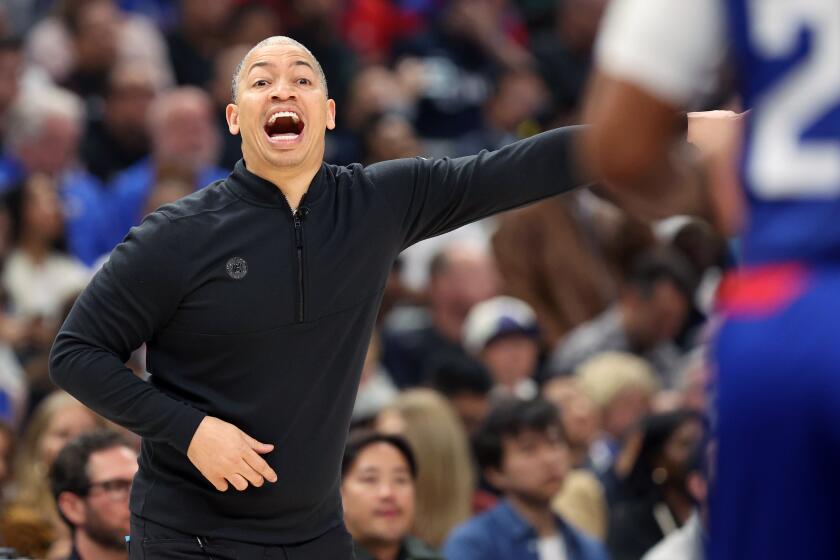Baseball Replacements Would Earn $115,000 : Labor: If there is no settlement, teams will have 32-player rosters.
- Share via
Players filling replacement roles on major league baseball rosters in 1995--if it comes to that--will be paid $115,000, with some exceptions, and each team will be permitted to have 32 of them.
The ruling executive council, meeting by phone Friday, approved replacement guidelines recommended by the recently appointed operations committee and faxed an outline of those guidelines to the 28 clubs, with the complete details to be distributed today.
The highlights, as learned from management sources, if the baseball strike called last August extends into the 1995 season:
--Each of the 28 clubs will have a replacement roster of 32 players, with the customary 25 active for each game and the seven others designated for a taxi squad. There will be no disabled list, and the 25-man active roster can be changed for each game.
--Replacement players will receive a prorated $115,000, the equivalent of $628.42 a day, the major league minimum in the recently implemented salary-cap system. Players in the $115,000 category will receive a $5,000 bonus on the 30th day of the season and $20,000 in termination pay, the same as all replacement players.
Any player with a contract signed before Jan. 20 will receive the salary designated in the contract if he decides not to honor the strike. An unsigned player on a major league roster who crosses the picket line will have his contract negotiated on the basis of the minimum scale included in the implementation.
Each team will also be allowed to sign three players at $275,000 each, but they must have three years of major league service. A player in this category would likely be a fading or fringe veteran who has most recently been on a minor league roster.
Boston Red Sox President John Harrington, the owners’ chief negotiator, said that barring a settlement, the clubs have to prepare to open the season with the best available players.
“All of the 28 clubs would like to avoid the scenario of using replacement players, but the clubs at this point can’t assume that (players on major league rosters) will report or remain in camp after they report,” he said.
General Manager Kevin Malone of the Montreal Expos said the replacement guidelines seemed “functional and practical” and that he expected most clubs to pursue minor league free agents and recently released or retired players, a process that has already begun. Malone also said he has heard rumors that 10%-20% of the union members will cross the line, a figure that a union official said was “grossly inflated.”
The union has maintained that the replacement rules--representing a change in working conditions by the major league clubs--must be agreed to in collective bargaining, but management counsel Chuck O’Connor disputed that Friday, saying he will inform the union of the guidelines as a courtesy but that union approval is not required.
The latest a club can open spring training, under the guidelines, is Feb. 20.
More to Read
Go beyond the scoreboard
Get the latest on L.A.'s teams in the daily Sports Report newsletter.
You may occasionally receive promotional content from the Los Angeles Times.










